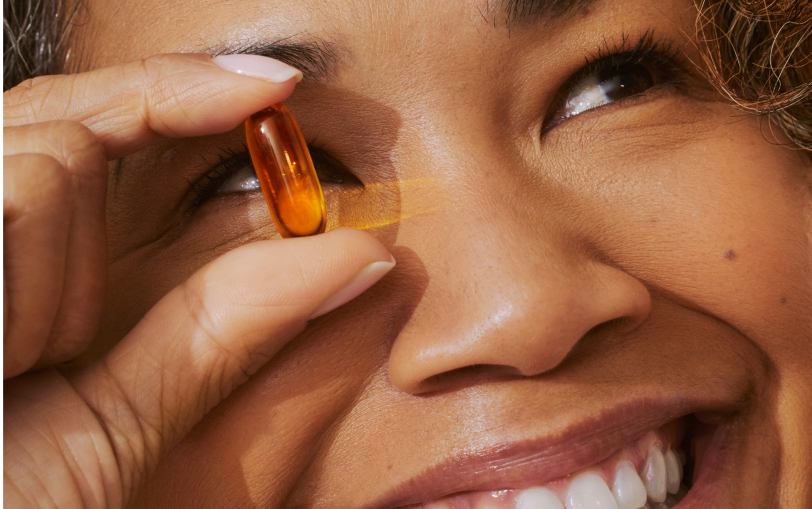science
What's the Difference Between EPA vs. DHA?
On This Page

If you’re looking for an omega-3 supplement, you probably want to know the difference between EPA and DHA, and whether you need one or both of them.
Essential fatty acids are a type of polyunsaturated fatty acid (PUFA) that cannot be made by the body and, therefore, must be obtained through food sources or supplements. These fatty acids produce hormones that are critical to regulating the immune system and central nervous system, among other things. Omega-3 fatty acids (omega-3s) are one group of these fatty acids, and DHA (docosahexaenoic acid) and EPA (eicosapentaenoic acid) are two of the most important omega-3s. The richest sources of EPA and DHA are marine sources such as seafood and fish oil supplements. The American Heart Association (AHA) recommends that adults consume at least two servings of fatty fish each week or take an omega-3 supplement containing at least 500 mg of EPA and DHA per day.
What is the Difference Between EPA and DHA?
The most significant difference between EPA and DHA is their chemical structure. EPA has 20 carbon atoms and 5 double bonds, and its main function is to produce eicosanoids, chemicals that contain strong antioxidant properties. DHA, on the other hand, has 22 carbon atoms and 6 double bonds, and also makes up approximately 8% of the total brain weight. These differences in structure manifest in how EPA and DHA are metabolized and used by the body. Both EPA and DHA are required for overall health.
EPA Health Benefits
EPA has strong antioxidant properties which makes it beneficial to the body’s immune system. It is also purported to be beneficial for cardiovascular function, mood support, cognitive function, and together with DHA, supports gray matter in the brain.
DHA Health Benefits
DHA has been associated with eye health, as the retina has a high concentration of omega-3s, especially DHA. It is also believed to support cognitive health and plays a key role in supporting the brain development of infants.
DHA supports brain health
The brain is approximately 60% fat, making it the fattiest organ in the body. Ninety-seven percent of the brain’s omega-3 fatty acid content is DHA. This high fatty acid content helps regulate the function and structure of the neurons, the messengers of the brain. When neurons are healthy and communicate better with each other, the overall brain function improves. DHA is critical for developing fetuses, babies, and young children. People who are planning to get pregnant, are pregnant, or are postpartum, are often recommended to supplement with DHA, though the decision to do so must be made in conjunction with their physician.
Is It Better to Take DHA or EPA?
DHA and EPA both offer the potential for numerous health benefits, but there are definitely some differences between the two that might make one seem more beneficial than the other, depending upon the circumstances.
DHA, which makes up a significant portion of the brain, is critical for brain function and development, especially in the fetal, and in babies and small children. It also helps to promote healthy vision, cardiovascular health, and cognitive function throughout life.
EPA is a powerful antioxidant that helps to support cardiovascular health and maintain healthy skin and hair.
If you are choosing between DHA and EPA, it is important to consider your specific health needs. DHA would likely prove to be more beneficial if you are looking to support brain and eye health. If it’s antioxidants or cardiovascular support you need, EPA would probably be the better choice. Most omega-3 supplements contain both DHA and EPA, so if you need to choose one over the other, it is best to make the decision in conjunction with your physician or healthcare provider.
Do you need both?
Ultimately, the goal should be to get your omega-3 fatty acids from food sources such as salmon, mackerel, trout, anchovies, oysters, cod liver oil, canned light tuna, and sardines. The AHA recommendation is that adults eat at least 2 servings of fatty fish per week, which is about 500 mgs of combined EPA and DHA. Most people do not follow this recommendation, and many choose supplementation.
EPA and DHA are both omega-3 fatty acids and have similar benefits, but they each offer more specialized benefits that could make one more suitable to your needs than the other. EPA is known for its powerful antioxidant properties, as well as its promotion of cardiovascular and cognitive health. DHA is crucial for brain and eye development from the fetal throughout life. Your healthcare provider could recommend whether or not you need both, but remember: Most omega-3 supplements include both.
The Bottom Line
Omega-3 fatty acids are essential fatty acids, meaning that they must come from an exogenous source. DHA and EPA are both omega-3s that are critical to the body’s overall wellbeing. Since one of the primary food sources of omega-3s is fatty fish, it is possible to attain adequate levels of omegas by simply adding two servings of fatty fish to your diet each week. If you are not getting enough omega-3s in your diet, supplementation is always a good option. If you are pregnant, thinking about becoming pregnant, lactating, have underlying health conditions, or take medication on a regular basis, consult your physician before making any changes to your current supplement regimen.
When choosing the best supplement for you, always look for a premium brand like Care/of’s Fish Oil supplement: Wild at Heart, a sustainably sourced, cold-pressed, extra virgin wild Alaskan salmon oil that supports heart, brain, and prenatal health.



